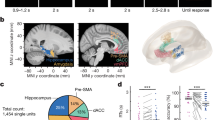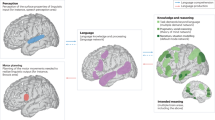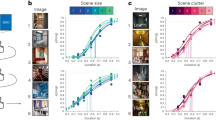Abstract
There has been a long controversy as to whether subjectively 'free' decisions are determined by brain activity ahead of time. We found that the outcome of a decision can be encoded in brain activity of prefrontal and parietal cortex up to 10 s before it enters awareness. This delay presumably reflects the operation of a network of high-level control areas that begin to prepare an upcoming decision long before it enters awareness.
This is a preview of subscription content, access via your institution
Access options
Subscribe to this journal
Receive 12 print issues and online access
$209.00 per year
only $17.42 per issue
Buy this article
- Purchase on Springer Link
- Instant access to full article PDF
Prices may be subject to local taxes which are calculated during checkout


Similar content being viewed by others
References
Libet, B. et al. Behav. Brain Sci. 8, 529–566 (1985).
Wegner, D.M. Trends Cogn. Sci. 7, 65–69 (2003).
Haggard, P. Trends Cogn. Sci. 9, 290–295 (2005).
Van de Grind, W. Conscious Cogn. 11, 241–264 (2002).
Glynn, I.M. Nature 348, 477–479 (1990).
Joordens, S., van Duijn, M. & Spalek, T.M. Conscious. Cogn. 11, 231–240 (2002).
Eccles, J.C. Arch. Psychiatr. Nervenkr. 231, 423–441 (1982).
Bechara, A., Damasio, H., Tranel, D. & Damasio, A.R. Science 275, 1293–1295 (1997).
Koechlin, E., Basso, G., Pietrini, P., Panzer, S. & Grafman, J. Nature 399, 148–151 (1999).
Burgess, P.W., Quayle, A. & Frith, C.D. Neuropsychologia 39, 545–555 (2001).
Haynes, J.D. et al. Curr. Biol. 17, 323–328 (2007).
Hampton, A.N. & O'Doherty, J.P. Proc. Natl. Acad. Sci. USA 104, 1377–1382 (2007).
Lau, H.C., Rogers, R.D., Haggard, P. & Passingham, R.E. Science 303, 1208–1210 (2004).
Haggard, P. & Eimer, M. Exp. Brain Res. 126, 128–133 (1999).
Haynes, J.D. & Rees, G. Nat. Rev. Neurosci. 7, 523–534 (2006).
Acknowledgements
The authors would like to thank D. Passingham and H. Lau for valuable comments and T. Mildner and S. Zysset for help with scanning. This work was funded by the Max Planck Society and the German Federal Ministry of Education and Research.
Author information
Authors and Affiliations
Contributions
J.-D.H., C.S.S., M.B. and H.-J.H. conceived the experiment. C.S.S. and J.-D.H. carried out the experiment. C.S.S. analyzed the data. J.-D.H. and C.S.S. wrote the paper.
Corresponding author
Supplementary information
Supplementary Text and Figures
Supplementary Figures 1–9, Table 1, Methods and Discussion (PDF 488 kb)
Rights and permissions
About this article
Cite this article
Soon, C., Brass, M., Heinze, HJ. et al. Unconscious determinants of free decisions in the human brain. Nat Neurosci 11, 543–545 (2008). https://doi.org/10.1038/nn.2112
Received:
Accepted:
Published:
Issue Date:
DOI: https://doi.org/10.1038/nn.2112
This article is cited by
-
Bridging the gap between consciousness and matter: recurrent out-of-body projection of visual awareness revealed by the law of non-identity
Integrative Psychological and Behavioral Science (2024)
-
Office Openess Affects Stress Regulation and Teamwork: A Neurophysiological Field Study
Occupational Health Science (2024)
-
The place of Free Will: the freedom of the prisoner
Neurological Sciences (2024)
-
Manipulating free will beliefs using online video games
Psychological Research (2023)
-
Does belief in free will influence biological motion perception?
Psychological Research (2023)



